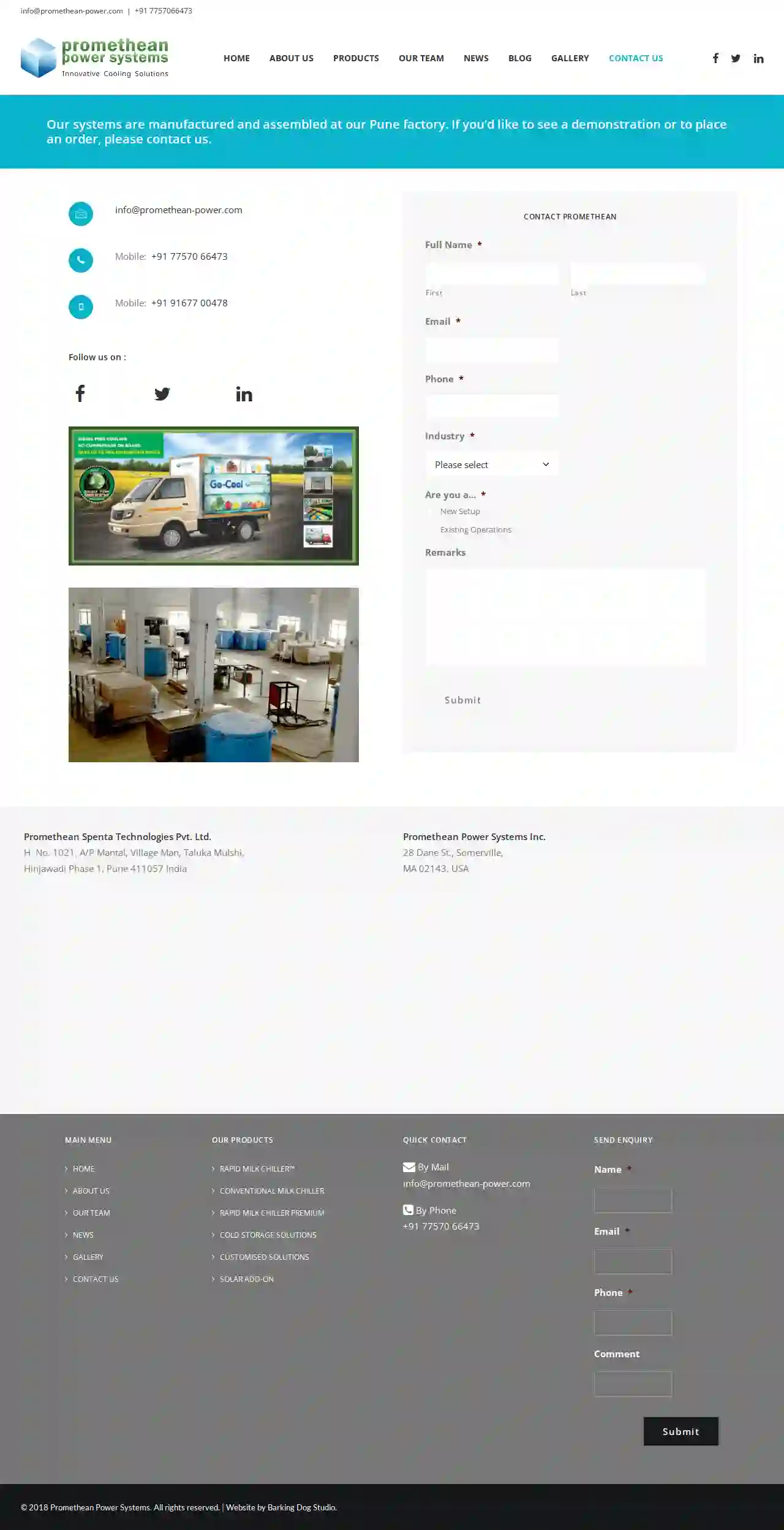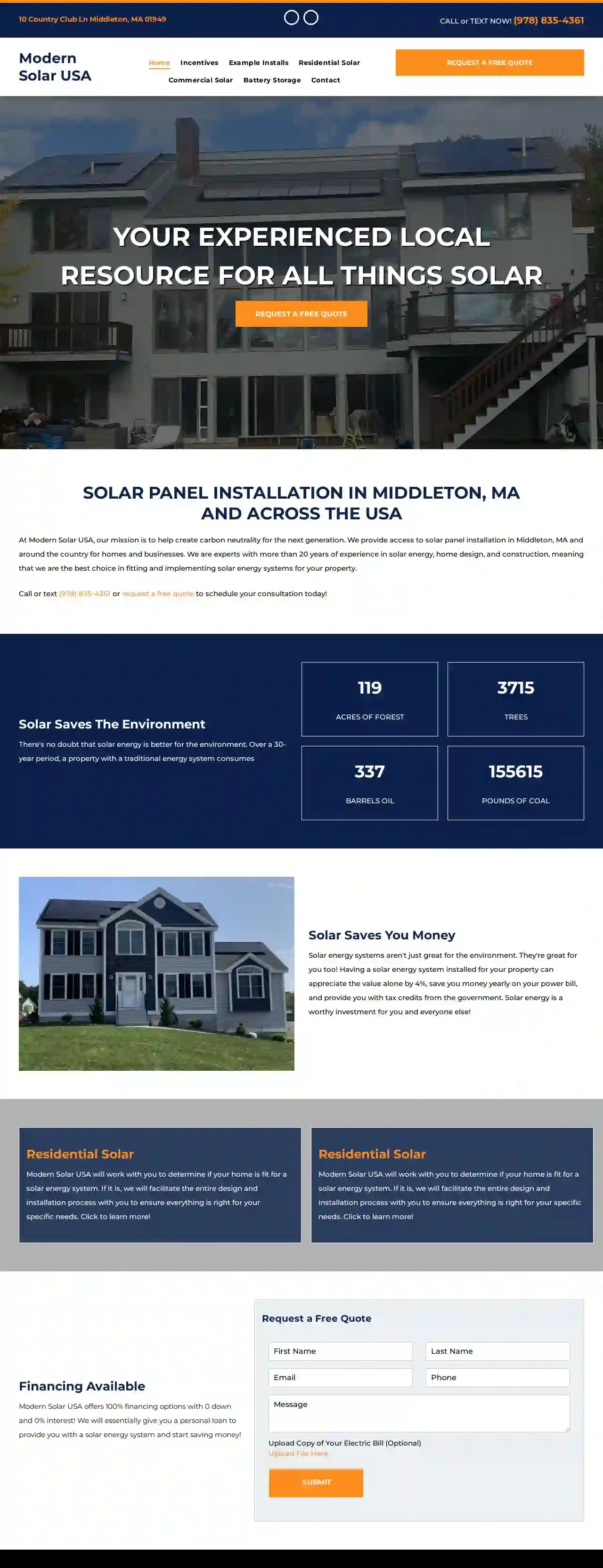Commercial Solar Installers Worcester
Find top Commercial Solar Company in Worcester
Receive 3 FREE Business Solar Installers quotes for your project today! Compare profiles, reviews, accreditations, portfolio, etc... and choose the best service.

Mass Renewables
4.58 reviews90 Mendon Street, Bellingham, MA, 02019, USMass Renewables is a leading solar energy installer in Massachusetts, offering a range of services including residential and commercial solar installations, electrical services, and additional services like mini splits and EV charging. With a focus on providing high-quality, durable systems that add value to homes and businesses, Mass Renewables has earned an A+ rating from the Better Business Bureau and is certified by the North American Board of Certified Energy Practitioners (NABCEP) and the federal Occupational Safety and Health Administration (OSHA).
- Services
- Why Us?
- Accreditations
- Our Team
- Testimonials
- Gallery
Get Quote
US SolarWorks
52 reviews64 Water Street, Attleboro, 02703, USUS SolarWorks is one of the most experienced commercial solar installers in the region. We strive to create great solutions for our customers, to install long-lasting, revenue-producing solar arrays, which are carefully integrated into your facility. We take the effort to work with you, to get you the results which fit your needs.
- Services
- Why Us?
- Accreditations
- Our Team
- Testimonials
- Gallery
Get Quote
Sunlight Solar Energy, Inc.
4.226 reviews150 NE Hawthorne Ave, Bend, USSunlight Solar provides system design and turn-key installation of grid-tied solar electric systems for homes and businesses throughout Oregon. With over 30 years of experience, we offer premium designs and competitive pricing for solar electric systems backed by industry-leading warranties and equipment.
- Services
- Why Us?
- Accreditations
- Our Team
- Testimonials
- Gallery
Get Quote
Valley Solar
4.9129 reviews123 Main St, Suite 100, Springfield, 01001, USValley Solar is a locally owned and operated solar panel installation company based in the greater Springfield area. They offer personalized service, big capabilities, and are experts in solar battery installations. Their team has passed rigorous energy storage certification exams and has installed hundreds of solar battery systems in western Massachusetts since 2020. They provide a range of easy, zero-down financing options and offer solar leases and Power Purchase Agreements. Valley Solar is an authorized dealer for Enphase, SolarEdge, and Tesla Energy.
- Services
- Why Us?
- Accreditations
- Our Team
- Testimonials
- Gallery
Get Quote
Promethean Power Systems
Hinjawadi Phase 1, Pune, H. No. 1021, A/P Mantal, Village Man, Taluka Mulshi, 411057, USPromethean Power Systems designs and manufactures refrigeration systems for cold-storage and milk chilling applications in off-grid and partially electrified areas of developing countries. Our goal is to empower smallholder farmers through decentralized, sustainable cold storage solutions.
- Services
- Why Us?
- Accreditations
- Our Team
- Testimonials
- Gallery
Get Quote
Modern Solar USA
11 reviews10 Country Club Ln, Middleton, MA 01949, 01949, USYOUR EXPERIENCED LOCAL RESOURCE FOR ALL THINGS SOLAR At Modern Solar USA, our mission is to help create carbon neutrality for the next generation. We provide access to solar panel installation in Middleton, MA and around the country for homes and businesses. We are experts with more than 20 years of experience in solar energy, home design, and construction, meaning that we are the best choice in fitting and implementing solar energy systems for your property.
- Services
- Why Us?
- Accreditations
- Our Team
- Testimonials
- Gallery
Get Quote
Boston Solar
4.712 Gill St. Suite - 5650, Woburn, MA 01801, 01801, USBoston Solar is a leading provider of solar energy solutions for residential and commercial properties in Massachusetts. With a focus on sustainability and energy efficiency, they offer a range of services including solar panel installation, solar financing options, and solar energy resources. Their team of experts is dedicated to providing top-quality service and ensuring customer satisfaction.
- Services
- Why Us?
- Accreditations
- Our Team
- Testimonials
- Gallery
Get Quote
Invaleon Technologies Corporation
445 reviewsSuite 1B, 26 Parkridge Rd., Haverhill, 01810, USInvaleon Solar is a leading provider of solar energy solutions for residential and commercial clients. Our team of experts is dedicated to delivering high-quality solar installations and exceptional customer service. We offer a range of services including solar panel installation, Tesla Powerwall, and EV charger installation. Our mission is to help our clients save money on their energy bills while also contributing to a greener future.
- Services
- Why Us?
- Accreditations
- Our Team
- Testimonials
- Gallery
Get Quote
Oberon Initiatives Inc.
4.942 reviews1438 Washington St., Stoughton, 02072, USOberon Energy Efficiency Solutions is a leading energy efficiency and renewable energy company that offers turnkey energy solutions to commercial, industrial, and residential customers. Their company is built around people with a proven track record in the field of Energy Efficiency and Renewable Energy. They offer the most advanced energy efficiency products based on the latest technologies and are headquartered in Massachusetts with operations expanding to neighboring states.
- Services
- Why Us?
- Accreditations
- Our Team
- Testimonials
- Gallery
Get Quote
DIY Solar Company, Inc.
4.615 reviewsDuxbury, MA, USA, 123 Solar Way, 02332, USDIY Solar Company, based in Duxbury, MA, offers top-tier solar installations in 34 states and DIY solar kits across USA, setting the standard for energy independence. DIY Solar is also the #1 Solar Repair Company in Massachusetts.
- Services
- Why Us?
- Accreditations
- Our Team
- Testimonials
- Gallery
Get Quote
Over 4,210+ Solar Companies in our network
Our solar installers operate in Worcester and beyond!
SolarCompaniesHub has curated and vetted the Best Solar Installers in and around Worcester. Find a top & trustworthy pro today.
Frequently Asked Questions About Commercial Solar Installations
- Panel Cleaning: Periodic cleaning of the panels removes dirt, debris, and bird droppings that can reduce energy production.
- Visual Inspections: Regularly inspect the system for signs of damage, loose wiring, or other issues.
- Inverter Monitoring: Monitor the inverter's performance and address any error codes or performance issues promptly.
- Vegetation Management: Trim trees and vegetation around the solar array to prevent shading, which can significantly reduce energy output.
- Professional Maintenance: It's recommended to have a professional solar installer or maintenance provider conduct a more thorough inspection and maintenance check every few years to identify potential problems and ensure optimal system performance.
- Reduced Energy Costs: Solar energy can significantly lower your monthly electricity bills, freeing up capital for other business expenses.
- Predictable Energy Expenses: Solar energy provides a hedge against fluctuating energy prices, allowing you to better forecast and manage your budget.
- Increased Property Value: Commercial properties with solar installations often have higher property values and can be more attractive to potential buyers or tenants.
- Environmental Sustainability: Solar energy is a clean and renewable energy source, reducing your carbon footprint and demonstrating your commitment to environmental responsibility.
- Tax Benefits and Incentives: Many governments offer tax credits, rebates, and other incentives to make commercial solar installations more affordable.
- Enhanced Brand Image: Going solar can boost your brand image and reputation, appealing to environmentally conscious customers and employees.
- System Size: Larger systems take longer to install.
- Roof or Ground Mount: Ground-mounted systems often involve more site preparation and civil work.
- Permitting and Inspections: The time required to obtain permits and schedule inspections can vary by location.
- Weather Conditions: Inclement weather can delay installation.
- Installer's Schedule: The installer's availability and workload will also affect the timeline.
What is involved in the maintenance of a commercial solar system?
What is the future of commercial solar?
What are the benefits of solar energy for my business?
How long does it take to install a commercial solar system?
What is involved in the maintenance of a commercial solar system?
- Panel Cleaning: Periodic cleaning of the panels removes dirt, debris, and bird droppings that can reduce energy production.
- Visual Inspections: Regularly inspect the system for signs of damage, loose wiring, or other issues.
- Inverter Monitoring: Monitor the inverter's performance and address any error codes or performance issues promptly.
- Vegetation Management: Trim trees and vegetation around the solar array to prevent shading, which can significantly reduce energy output.
- Professional Maintenance: It's recommended to have a professional solar installer or maintenance provider conduct a more thorough inspection and maintenance check every few years to identify potential problems and ensure optimal system performance.
What is the future of commercial solar?
What are the benefits of solar energy for my business?
- Reduced Energy Costs: Solar energy can significantly lower your monthly electricity bills, freeing up capital for other business expenses.
- Predictable Energy Expenses: Solar energy provides a hedge against fluctuating energy prices, allowing you to better forecast and manage your budget.
- Increased Property Value: Commercial properties with solar installations often have higher property values and can be more attractive to potential buyers or tenants.
- Environmental Sustainability: Solar energy is a clean and renewable energy source, reducing your carbon footprint and demonstrating your commitment to environmental responsibility.
- Tax Benefits and Incentives: Many governments offer tax credits, rebates, and other incentives to make commercial solar installations more affordable.
- Enhanced Brand Image: Going solar can boost your brand image and reputation, appealing to environmentally conscious customers and employees.
How long does it take to install a commercial solar system?
- System Size: Larger systems take longer to install.
- Roof or Ground Mount: Ground-mounted systems often involve more site preparation and civil work.
- Permitting and Inspections: The time required to obtain permits and schedule inspections can vary by location.
- Weather Conditions: Inclement weather can delay installation.
- Installer's Schedule: The installer's availability and workload will also affect the timeline.